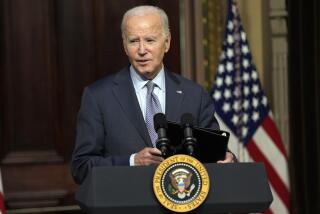Boskin’s Final Economic Report Defends Bush’s Policy : Policy: The White House adviser says the Administration’s critics are trying to rewrite history.
- Share via
WASHINGTON — In the Bush Administration’s fourth and final Economic Report of the President, Michael J. Boskin, the chief White House economic adviser, defended the economic policies of 12 years of Republican rule, arguing that “revisionists” are wrong to blame the Reagan-Bush era for the nation’s economic ills.
The two Republican Administrations will be best remembered for bringing policies to Washington that were designed to reduce the government’s intrusion in the marketplace, thus reversing many of the ills that plagued the economy in the late 1970s, Boskin said in the report to be released today.
Yet Boskin conceded that the Bush Administration made mistakes on economic policy, telling reporters Tuesday that he regrets the Administration did not push for a sizable fiscal stimulus package in the second half of 1991, when the economy worsened and voters began to rebel.
Boskin noted that the decision by the White House then to stand pat on the economy “cost President Bush dearly.”
Boskin’s report challenged critics who have labeled the last 12 years a “calamitous mistake.” He argued that the policies of the 1980s were far better than those of the 1960s and 1970s. Furthermore, he said, he believes that those who question Bush’s tendency to keep his hands off the economy--people such as President-elect Bill Clinton--are wrong.
“There is no reason to believe that bureaucrats or politicians are better able than private individuals or firms to allocate resources to their most productive uses,” the report states.
The report also argues that the Reagan and Bush Administrations have set the stage for a more stable economic environment than they inherited.
“A major success of the economic policies of the past decade was the reduction of inflation to its lowest level in a generation,” the report states. “Partially in response to lower tax rates, the defense buildup and reduction of inflation, the economy commenced its longest peace-time expansion in the nation’s history. . . . (And) the rate of unemployment declined from its peak of 10.8% at the end of 1982 to 5.2% in June, 1990, declining for all major industrial occupational and demographic categories.”
The report also included the Administration’s latest economic forecast, which calls for a 3% rate of growth in 1993.
More to Read
Get the L.A. Times Politics newsletter
Deeply reported insights into legislation, politics and policy from Sacramento, Washington and beyond. In your inbox twice per week.
You may occasionally receive promotional content from the Los Angeles Times.







